 These days, technology has to do more than just work. Eco-friendliness and energy conservation are top priorities in all industries and are just as important as productivity and efficiency. Therefore, technology has to be designed to meet those needs in order to be useful for the companies that implement it. That’s one of the reasons why heat exchangers have become such a popular electrical cooling solution. They rely on thermal management processes that epitomize eco-friendliness, and they those same processes allow heat exchangers to operate with minimal energy consumption. The secret lies in how heat exchangers transfer heat and the innovative ways in which they can be designed to fit virtually any application’s specific requirements. (more…)
These days, technology has to do more than just work. Eco-friendliness and energy conservation are top priorities in all industries and are just as important as productivity and efficiency. Therefore, technology has to be designed to meet those needs in order to be useful for the companies that implement it. That’s one of the reasons why heat exchangers have become such a popular electrical cooling solution. They rely on thermal management processes that epitomize eco-friendliness, and they those same processes allow heat exchangers to operate with minimal energy consumption. The secret lies in how heat exchangers transfer heat and the innovative ways in which they can be designed to fit virtually any application’s specific requirements. (more…)
Thermal Management that Doesn’t Require Constant Attention
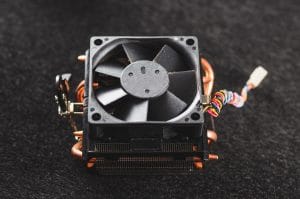 Over the last century, technology of all types has advanced at a more rapid pace than ever before, and heat exchangers have played a vital role in many of those advancements. Simply allowing for more efficient and reliable ways to manage waste heat has provided innovators the freedom to create more powerful and compact designs than ever before. In more recent decades, most technological innovations have focused on allowing the humans that use them to be more productive with their time. This includes various forms of automated technology and equipment that are designed to operate with minimal or no human interaction. For such solutions to work, they require thermal management systems that are just as automated, which has made heat exchangers even more vital to such technology’s success. (more…)
Over the last century, technology of all types has advanced at a more rapid pace than ever before, and heat exchangers have played a vital role in many of those advancements. Simply allowing for more efficient and reliable ways to manage waste heat has provided innovators the freedom to create more powerful and compact designs than ever before. In more recent decades, most technological innovations have focused on allowing the humans that use them to be more productive with their time. This includes various forms of automated technology and equipment that are designed to operate with minimal or no human interaction. For such solutions to work, they require thermal management systems that are just as automated, which has made heat exchangers even more vital to such technology’s success. (more…)
Can Heat Exchangers Work in the Oil and Gas Industry?
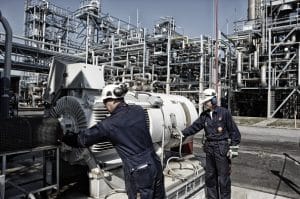 Once companies began transforming their electrical cooling operations with the use of heat exchangers, the benefits of the innovative thermal management solutions became glaringly obvious. However, becoming a cornerstone of manufacturing and other technologies hasn’t always been easy. For instance, some operations still required cooling solutions that provided temperatures well below ambient temperatures, and therefore, still clung to air conditioners to effectively meet those needs. In some industries, operations often occur in extreme climates and conditions, which typical heat exchangers were not meant to withstand. As they’ve advanced, however, heat exchangers have become versatile enough to meet any demand that any industry requires, including the particularly tough conditions of the oil and gas industry. (more…)
Once companies began transforming their electrical cooling operations with the use of heat exchangers, the benefits of the innovative thermal management solutions became glaringly obvious. However, becoming a cornerstone of manufacturing and other technologies hasn’t always been easy. For instance, some operations still required cooling solutions that provided temperatures well below ambient temperatures, and therefore, still clung to air conditioners to effectively meet those needs. In some industries, operations often occur in extreme climates and conditions, which typical heat exchangers were not meant to withstand. As they’ve advanced, however, heat exchangers have become versatile enough to meet any demand that any industry requires, including the particularly tough conditions of the oil and gas industry. (more…)
What Heat Exchangers Actually Optimize
 It’s become generally accepted that heat exchangers are often the preferable solution for streamlining electrical thermal management. Exactly how they do so is no secret – heat exchangers transfer heat instead of eliminating it – but the many different benefits that stem from streamlined thermal management often far exceed expectations. Besides simplifying the process of cooling electrical enclosures, cabinets, and equipment, heat exchangers also give companies the freedom to optimize several other areas of their operations, as well. (more…)
It’s become generally accepted that heat exchangers are often the preferable solution for streamlining electrical thermal management. Exactly how they do so is no secret – heat exchangers transfer heat instead of eliminating it – but the many different benefits that stem from streamlined thermal management often far exceed expectations. Besides simplifying the process of cooling electrical enclosures, cabinets, and equipment, heat exchangers also give companies the freedom to optimize several other areas of their operations, as well. (more…)
Important Aspects of Heat Exchanger Design
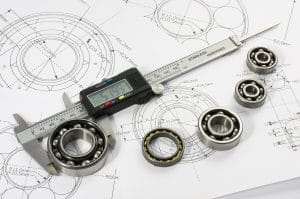 Like most forms of advanced technology, heat exchangers are often tailored to meet the specific needs of the application they’re used for. As the variety of technology has expanded, so have the different uses and operating specifications of modern heat exchangers. To continuously provide the high-quality thermal management capabilities that they’re known for, heat exchangers go through a series of concept and product designs, testing, and prototyping before being manufactured. These steps help ensure that every heat exchanger successfully meets or exceeds expectations. (more…)
Like most forms of advanced technology, heat exchangers are often tailored to meet the specific needs of the application they’re used for. As the variety of technology has expanded, so have the different uses and operating specifications of modern heat exchangers. To continuously provide the high-quality thermal management capabilities that they’re known for, heat exchangers go through a series of concept and product designs, testing, and prototyping before being manufactured. These steps help ensure that every heat exchanger successfully meets or exceeds expectations. (more…)
Eco-Friendly Thermal Management for NEMA Enclosures
 While cooling any electrical enclosure comes with a variety of concerns, maintaining enclosures that are designed to meet NEMA certifications comes with its own set of additional challenges. Besides being consistent and reliable, NEMA-class electrical cooling solutions also have to ensure the high level of ingress protection that the enclosure must maintain, as well as produce a minimal environmental footprint (or none at all). Fortunately, heat exchangers have excelled at meeting and exceeding expectations for electrical enclosures of all types, including NEMA-class ones that demand the highest quality thermal management solutions. (more…)
While cooling any electrical enclosure comes with a variety of concerns, maintaining enclosures that are designed to meet NEMA certifications comes with its own set of additional challenges. Besides being consistent and reliable, NEMA-class electrical cooling solutions also have to ensure the high level of ingress protection that the enclosure must maintain, as well as produce a minimal environmental footprint (or none at all). Fortunately, heat exchangers have excelled at meeting and exceeding expectations for electrical enclosures of all types, including NEMA-class ones that demand the highest quality thermal management solutions. (more…)
How Different Industries Benefit from Heat Exchangers
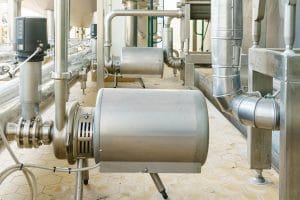 Thermal management comes in many different forms and has a wide variety of implications that are often specific to individual industries. One of the reasons why heat exchangers have excelled in almost every industry is because the advanced thermal management technology they’re designed from is versatile enough to address nearly all of those implications. While managing electrical waste heat is one of their most common applications, modern heat exchangers can also bring advanced heat transfer capabilities to bear for many other, equally important applications. (more…)
Thermal management comes in many different forms and has a wide variety of implications that are often specific to individual industries. One of the reasons why heat exchangers have excelled in almost every industry is because the advanced thermal management technology they’re designed from is versatile enough to address nearly all of those implications. While managing electrical waste heat is one of their most common applications, modern heat exchangers can also bring advanced heat transfer capabilities to bear for many other, equally important applications. (more…)
A Look at Transferring Heat vs. Chilling It
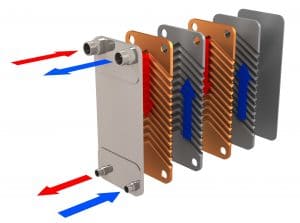 There are many reasons why heat exchangers have become preferable over most other thermal management solutions, and most of those reason stem from the fact that they don’t rely on chilling electrical enclosures to prevent overheating. For example, because heat exchangers transfer heat instead of chilling it, they don’t require as much equipment. This means they can fit into smaller spaces without losing their effectiveness, and they can operate continuously (often 24/7) with minimal energy requirements. Compared to chilling control panels and other electrical enclosures with air conditioning or air compressors, their ability to rapidly transfer heat makes them preferable in a wide variety of applications. (more…)
There are many reasons why heat exchangers have become preferable over most other thermal management solutions, and most of those reason stem from the fact that they don’t rely on chilling electrical enclosures to prevent overheating. For example, because heat exchangers transfer heat instead of chilling it, they don’t require as much equipment. This means they can fit into smaller spaces without losing their effectiveness, and they can operate continuously (often 24/7) with minimal energy requirements. Compared to chilling control panels and other electrical enclosures with air conditioning or air compressors, their ability to rapidly transfer heat makes them preferable in a wide variety of applications. (more…)
Reducing Maintenance Costs with Better Thermal Management
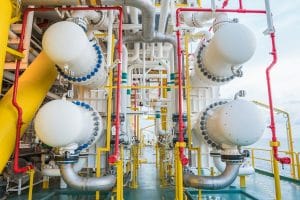 When it comes to consistently cooling electrical equipment, routine maintenance and repairs are vital. Thermal management prevents technology from overheating, and therefore, they prevent entire systems from crashing and having to be shut down for more extensive repairs or replacement. Therefore, preventing thermal management failures and hiccups is paramount for a company to keep its operations running smoothly. With modern heat exchangers, companies can enjoy greater peace of mind knowing their electrical thermal management needs are being met consistently and much less energy or need for maintenance than more traditional solutions. (more…)
When it comes to consistently cooling electrical equipment, routine maintenance and repairs are vital. Thermal management prevents technology from overheating, and therefore, they prevent entire systems from crashing and having to be shut down for more extensive repairs or replacement. Therefore, preventing thermal management failures and hiccups is paramount for a company to keep its operations running smoothly. With modern heat exchangers, companies can enjoy greater peace of mind knowing their electrical thermal management needs are being met consistently and much less energy or need for maintenance than more traditional solutions. (more…)
The Long-Term Impacts of Heat Exchangers
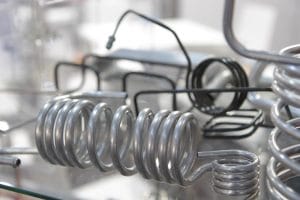 If asked what the greatest benefit of heat exchangers was, a company’s answer would depend on what its specific thermal management requirements are. For instance, most companies benefit from being able to keep their electrical enclosures cool without needing air conditioners. That automatically comes with a variety of benefits, but other companies might also enjoy the advantages of cleaner, more efficient, and more precise thermal management in several other processes. Whatever the specific benefits, the greatest advantage of heat exchangers is that they can operate more efficiently and more reliably than other solutions, and in many cases, they can do so for much longer. (more…)
If asked what the greatest benefit of heat exchangers was, a company’s answer would depend on what its specific thermal management requirements are. For instance, most companies benefit from being able to keep their electrical enclosures cool without needing air conditioners. That automatically comes with a variety of benefits, but other companies might also enjoy the advantages of cleaner, more efficient, and more precise thermal management in several other processes. Whatever the specific benefits, the greatest advantage of heat exchangers is that they can operate more efficiently and more reliably than other solutions, and in many cases, they can do so for much longer. (more…)







